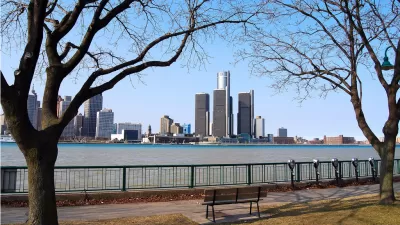Federal judge Steven Rhodes approved Detroit’s plan to shed $7 billion of the total $18 billion debt.
Sixteen months after the Motor City declared bankruptcy, a federal judge approved of Detroit’s plan to move forward in repaying its debt, reports Michael Fletcher of The Washington Post.
For one, Detroit will set aside "$1.7 billion in new investments over the next nine years — a vast sum for a city that for decades has been trimming investments and in recent years had capital expenditures of just $10 million... The money will go to new computer systems, fire trucks, ambulances and other infrastructure aimed at reviving city services that in many cases had failed to function in recent years."
In addition, according to Monica Davey and Mary Williams Walsh of The New York Times, "Retired general municipal workers agreed to 4.5 percent cuts to their monthly pension checks, an end to cost-of-living increases, higher health care costs and a mandatory forfeiture of previous payments from the pension system that were deemed improper. Retired police officers and fire fighters have accepted smaller reductions."
Detroit’s retirees were a major stakeholder in the negotiations process, and they received a better deal than first proposed due to the "grand bargain," where "foundations, the state and the Detroit Institute of Arts pledged millions of dollars to bolster the city pension system and give the art collection new, bankruptcy-proof ownership."
Despite this new ruling, Detroit’s future is still hazy as the bankruptcy plans leave little financial wiggle room for the future. However, the deal does limit the amount of appellate litigation the Motor City could face in the future, as these are costly legal wars are being waged by many other bankrupt jurisdictions as they exit bankruptcy.
FULL STORY: Federal judge approves Detroit’s blueprint to exit bankruptcy

Planetizen Federal Action Tracker
A weekly monitor of how Trump’s orders and actions are impacting planners and planning in America.

Chicago’s Ghost Rails
Just beneath the surface of the modern city lie the remnants of its expansive early 20th-century streetcar system.

San Antonio and Austin are Fusing Into one Massive Megaregion
The region spanning the two central Texas cities is growing fast, posing challenges for local infrastructure and water supplies.

Since Zion's Shuttles Went Electric “The Smog is Gone”
Visitors to Zion National Park can enjoy the canyon via the nation’s first fully electric park shuttle system.

Trump Distributing DOT Safety Funds at 1/10 Rate of Biden
Funds for Safe Streets and other transportation safety and equity programs are being held up by administrative reviews and conflicts with the Trump administration’s priorities.

German Cities Subsidize Taxis for Women Amid Wave of Violence
Free or low-cost taxi rides can help women navigate cities more safely, but critics say the programs don't address the root causes of violence against women.
Urban Design for Planners 1: Software Tools
This six-course series explores essential urban design concepts using open source software and equips planners with the tools they need to participate fully in the urban design process.
Planning for Universal Design
Learn the tools for implementing Universal Design in planning regulations.
planning NEXT
Appalachian Highlands Housing Partners
Mpact (founded as Rail~Volution)
City of Camden Redevelopment Agency
City of Astoria
City of Portland
City of Laramie





























